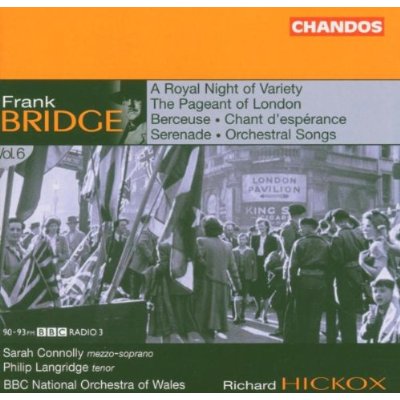PAGEANT OF LONDON

Faber Music, available world wide from Alfred music
Frank Bridge was one of the finest English composers of the first half of the 20th century. The Pageant of London is his only work for wind band, comprising of two marches, one scored from Bridge’s best known organ piece and including the chimes of Big Ben, plus three short renaissance pastiche items, one arranged from Playford (later used by Peter Warlock in Capriol Suite). The music is tuneful, approachable and makes a fine alternative to Holst’s two suites, which were composed around the same time. I have introduced this work to concert bands right across the world. It has been performed in USA and the Far East, recorded by the celebrated Kosei Wind Orchestra of Japan and also by the BBC National Orchestra of Wales in the Chandos edition of Bridge Orchestral Music.
Festival of Empire, 1911
Taking place at Crystal Palace, sixty years after the Great Exhibition, the Festival of Empireopened with a ‘Grand Opening Concert’ on 12 May 1911. This consisted of an ‘Imperial choir’ of 4500 voices, with music provided by the Queen’s Hall Orchestra, the London Symphony Orchestra and the Festival of Empire Military Band. The concert included Elgar’s arrangement of ‘God Save the King’ and his ‘Land of Hope and Glory’, as well as a ‘Patriotic Chorus: For Empire and for King’ by Percy E. Fletcher.
A huge 'historical' pageant which consisted of four parts, staged over three days by 15,000 volunteers, ran for four months, and was organized by Frank Lascelles, who was known at the time as ‘the man who staged the Empire’ as he was also responsible for the Coronation Durbar in Delhi in 1911. The pageant was designed to represent, as the souvenir book claimed, ‘the gradual growth and development of the English nation, as seen in the history of this, the Empire City.’ It was one of the numerous events held to celebrate the coronation of King and Emperor George V. To represent the Indian aspect of empire, the pageant included a re-enactment of the 1877 Delhi Durbar where Queen Victoria was proclaimed empress.
The Festival, by all accounts, was pure imperialist propaganda. The souvenir brochure used a domestic rhetoric to signal the event’s aims: it was ‘a Social Gathering of the British Family’ to encourage the ‘firmer welding of those invisible bonds which hold together the greatest empire the world has ever known’.